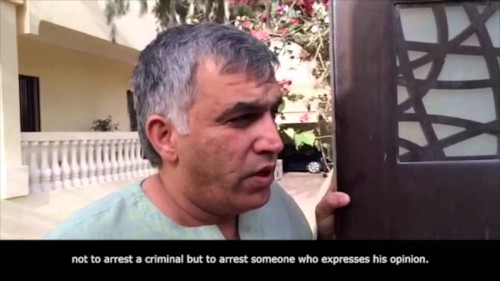Away from the international spotlight despite more than four years of protests over rights and reforms, Bahrain’s regime has continued to crack down on dissent.
On Thursday, police again arrested Nabeel Rajab, the head of the Bahrain Center for Human Rights. The Interior Ministry, referring to messages on Rajab’s Twitter account, said he was “publishing information that would harm the civil peace and insulting a statutory body in violation of the law”.
The Ministry did not say which tweets were criminal; however, Rajab had recently used the account to publicize his article in The Huffington Post claiming abuse of detainees in Jaw Prison:
My latest piece: Into #Bahrain's Jaws of Hell http://t.co/I93cnjspwq via @HuffPostUK
— Nabeel Rajab (@NABEELRAJAB) March 27, 2015
Rajab has been arrested and detained on several occasions since mass protests began in February 2011. He served two years in prison before his release on May 2014. He was re-arrested in October over Twitter comments and released a month later on bail. Convicted in January of publicly insulting two state institutions, he is appealing the ruling.
“About 20 cars surrounded our house today and the police came in and told us they were arresting Nabeel for some comments on his Twitter account criticising torture in prisons,” his wife Sumaia Rajab said on Thursday.
Rajab’s arrest is only one of the most prominent amid recent detentions, including the head of the main opposition group Al-Wefaq. Sheikh Ali Salman was seized in December after he protested the regime’s conduct of elections; he was charged with incitement against the government, calling for its overthrow by force, and inciting youth to revolt.
Other activists are serving lengthy sentences over protests. The founder of the Bahrain Center for Human Rights, Abdulhadi al-Khawaja, has been imprisoned for life.
More than 80 people were allegedly killed by security forces during demonstrations.

